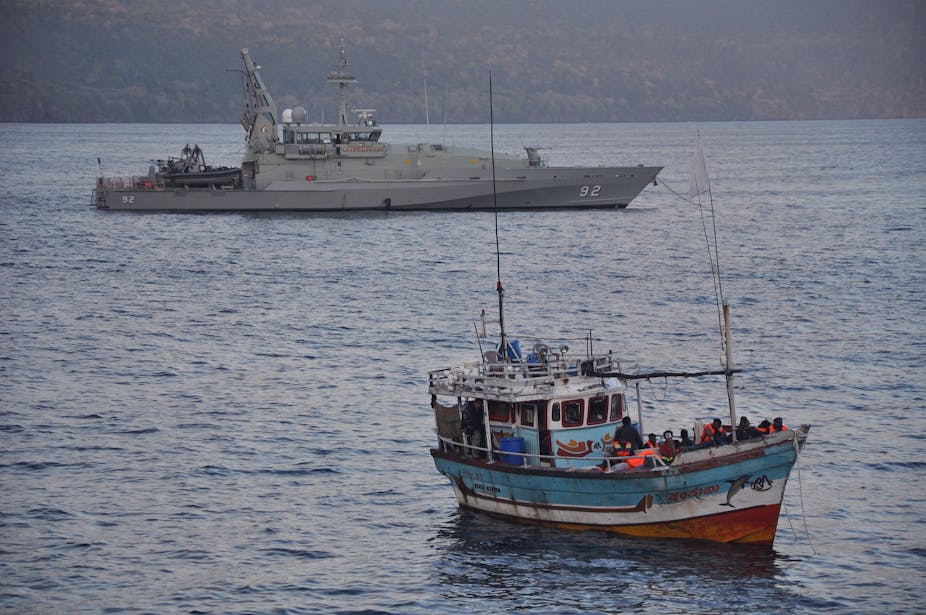The Coalition promises it will “turn back” asylum seeker boats in Australian waters where it is safe to do so if it wins the next election.
With Australian border patrols said to be at “breaking point” with the numbers of boat arrivals, the asylum debate has reached a heightened pitch in intensity.
But what are the facts? Can the Coalition legally turn back boats? Can boats be towed back out of Australian waters? Or intercepted in international waters?
The Conversation spoke with Ben Saul, Professor of International Law, Sydney Centre for International Law at the University of Sydney, to gain a sense of the legal ramifications of a potential “tow back” or “turn back” policy.
Is it legal for Australian forces to turn back or tow back asylum seeker boats?
Australia cannot turn back boats if it would expose a person to return to persecution contrary to the [UN] refugee convention. That includes sending people back to countries which do not offer effective refugee protection. Those can include transit countries like Indonesia and Malaysia where there is no refugee protection status given to people who are there to claim refugee status.
The second consideration is under the law of the sea. It is not legal to turn back a boat which is unseaworthy and on which the lives of passengers are in danger or at risk. Those kind of operational decisions about the safety of boats will be particularly important in assessing whether a “turn back” is legal.
A third factor is that Australia has no right to board and search foreign vessels on the high seas, so Australia’s power to turn back boats is really confined in most cases to boats which are already in Australian territorial waters. The only case in which Australia could board a vessel on the high seas that is outside Australian territorial waters is where the vessel is not registered to another country - in other words, it is a stateless vessel, or where vessel is at risk and it’s a rescue of people whose lives are at risk at sea.
Is there any legal difference between turning back boats or towing them back? Is there any element of culpability?
It could only have relevance in certain situations - for example, if a boat is not seaworthy. But by attaching a rope to it and towing it by an Australian vessel, that would make the boat safe enough to continue back to an Indonesia port. That case is pretty unlikely though - it might arise where an engine onboard a vessel is no longer functioning, but the boat itself is safe, so it would be a way of enabling the boat to return from where it came.
That would ultimately require the safety of the vessel to be ensured, so Australia presumably would then need to tow it right back to an Indonesian port. It couldn’t just then leave the boat stranded without a motor on the edge of the Indonesian territorial sea, for example. Indonesia is fairly unlikely to accept the right of Australian naval vessels to bring refugee boats back into Indonesia.
Are there international examples of countries doing this? Have they been doing it legally?
It’s pretty rare by world standards but it has happened. I guess the most prominent example is the United States, which over some decades now has had a “turn back” - and “tow back” policy in some cases - of vessels with people coming from both Haiti and Cuba. The rationale is that according to the United States, most of those people are not refugees and therefore are just coming to America for a better life. Whether that’s legal obviously depends upon whether they are refugees: typically, many people coming from Cuba fleeing Castro’s regime were in fear of persecution, and so too in Haiti where there were various troubles, so that potentially engages the international legal responsibility of the United States.
What the United States did to try to comply with international law though was to have refugee status determination personnel onboard US coastguard vessels, which were intercepting these boats. So if a person expressed a fear of persecution they could make that claim to somebody onboard the vessel that their hearing be expedited, and a decision would then be made. Obviously that’s not optimal, and then if you expedite processing like that it might magnify the risk of making bad decisions and sending back someone who is actually a refugee.

